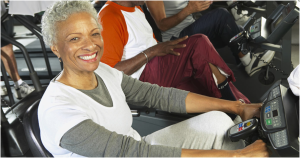

Feeling unmotivated to exercise? If you repeatedly tell yourself how much you hate to do it, your workout may suffer from your bad attitude. Turning negative self-talk around allows you to not only feel better, but also to exercise harder and for longer periods of time, studies show. More intense exercise for longer periods burns more calories and may eventually help speed weight loss when done consistently.
Cyclists who repeated motivational phrases to themselves, such as, “I got this,” pedaled for an average of two minutes longer and reported easier effort than when compared to a baseline ride, according to a study published in the journal, Medicine and Science in Sports and Exercise. In short, what you say can and will be used against you (or for you!) during your workout.
(MORE: Don’t Walk, Jog: The Case for Higher Intensity)
To transform negative thoughts into motivating ones, start by drawing a line down the middle of a piece of paper, says Jonathan Alpert, New York-based psychotherapist and author of Be Fearless: Change Your Life In 28 Days.
“On the left, write the negative, self-defeating thought (the act of recognizing them is huge). On the right side, re-frame the thought,” Alpert says. Here are seven ways to fill out the right side of your paper with phrases to get you going:
- Instead of thinking: “I’m too old.” Change to: “I can make progress no matter what my age.”
Age doesn’t discriminate, Alpert says. “A body is a body and it functions best when it is in shape, regardless of the age,” he notes. Also, exercise performs functions far beyond just making you look toned. Weight training, in particular, helps you maintain muscle that would otherwise diminish with aging (called sarcopenia) and provides resistance to reduce the risk of osteoporosis after menopause.
- Instead of thinking: “I don’t know what I’m doing.” Change to: “I can ask a qualified person to help me if I need it.”
You have many options to help if you are just starting out. “When this is new to you, you’re not expected to know exactly what you’re doing,” Alpert says. “But you can consult with people who do know what they’re doing and get some guidance.” Ask a certified personal trainer (even one or two sessions helps) or look for online videos and DVDs developed by fitness pros.
(MORE: Find a Fitness Trainer to Get the Most Out of Exercise)
- Instead of thinking: “Everyone looks way better than me.” Change to: “I, too, can look as good as they do if I keep working out.”
It’s not a beauty contest, it’s a gym, Alpert says. “Focus on your reasons for being there: to work out and get into shape — not to be stared at or compare yourself to others.”
In addition, Alpert recommends finding a gym that attracts members who are like you, with a similar level of fitness. “This may mean shying away from the hardcore iron-pumping gyms,” he says. Try a beginner’s yoga class or group water aerobics class instead.
- Instead of thinking: “I’m too tired.” Change to: “Exercise energizes me.”
One of the great benefits of exercise is that actually gives you more energy, says Elizabeth Lombardo, psychotherapist and author of book Better Than Perfect: 7 Strategies to Crush Your Inner Critic and Create a Life You Love. “Remember that the boost in positive energy you will get as you continue to work out is better than coffee,” she says. Exercise boosts energy by helping your cardiovascular system work more efficiently, which gives you more energy for everyday activities.
- Instead of thinking: “I’ll never be in shape, so why bother?” Change to: “I can get in shape, as long as I stick to it.”
Because the visible results are not immediate, and can take three or more months to become evident, focus on being proud of doing the workout, Lombardo says. “Reward that, rather than waiting for the longer-term results, as you continue to take steps to a healthier body,” she advises. A study published in Journals of Gerontology showed improved quality of life as well as overall physical functioning and endurance in people up to 89 years old who began an exercise program.
(MORE: Why Your Friends Can Be Bad for Your Weight)
- Instead of thinking: “This is too hard.” Change to: “The more I practice, the stronger I’ll become.”
Focus your attention on how good it feels to overcome a challenging workout, to not give up, to really kick your butt in a healthy way, Lombardo says. If you find yourself injured or repeatedly frustrated, it may be time to back off a bit or find another activity.
- Instead of thinking: “I hate exercise!” Change to: “I’ll find an activity I enjoy.”
Find something you can do for even five or 10 minutes, says Lorie Parch, founder of ih8exercise.com. “It can help to go back to a time before moving your body felt like a chore, which may provide clues to what you may like today. Even if you can’t find something you like, find something you at least don’t mind doing for a short period of time.”
Next Avenue contributor Linda Melone is a California-based freelance writer specializing in health, fitness and wellness for women over 50.
© Twin Cities Public Television – 2015. All rights reserved.